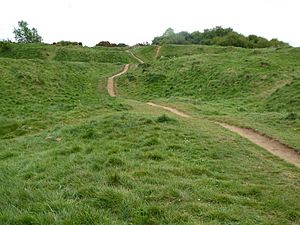Bradlaugh Fields facts for kids
Quick facts for kids Bradlaugh Fields |
|
|---|---|

Hills and Holes Local Nature Reserve
|
|
| Type | Nature reserve |
| Location | Northampton |
| OS grid | SP 765 639 |
| Area | 17.5 hectares |
| Managed by | Wildlife Trust for Bedfordshire, Cambridgeshire and Northamptonshire |
Bradlaugh Fields is a large open space in Northampton, covering about 60 hectares. It's a great place for nature and outdoor activities. This area used to be a golf course.
In 1987, there were plans to build houses on this land. But local people really wanted to protect it. They started a big campaign to save the fields. Because of their efforts, Northampton Borough Council bought the land. It was then opened as a wildlife park in 1998.
The park is named after Charles Bradlaugh. He was an important person in the 1800s. Charles Bradlaugh was a Member of Parliament (MP) for Northampton. He was known for wanting big changes in society.
A special part of Bradlaugh Fields is managed as a nature reserve. This reserve covers 17.5 hectares. It is looked after by the Wildlife Trust for Bedfordshire, Cambridgeshire and Northamptonshire. The reserve has three main areas: Hills and Holes, Scrub Field, and Quarry Field.
Contents
Exploring the Nature Reserve
The Bradlaugh Fields nature reserve is home to many interesting plants and animals. It has very old hedgerows. These are like natural fences made of bushes and trees. It also has "unimproved grassland." This means the grass has not been changed by farming or chemicals. This type of grassland is great for wildflowers and insects.
Wildlife You Might See
Many different birds live here. You might spot tiny blue tits or hear the song of a chiffchaff. Larger birds like great spotted woodpeckers also visit. Keep an eye out for fast-flying sparrowhawks. In winter, you might see birds like redwings and fieldfares. They come from colder places to find food.
Hills and Holes Area
Hills and Holes is an 8.3 hectare Local Nature Reserve. It's at the southern end of Bradlaugh Fields. This area used to be a quarry, where rocks were dug out. Now, it has grassy ridges and hollows. Some of these slopes are quite steep! It has different types of habitats. One special type is "limestone grassland." This kind of grass grows well in soil with limestone.
Scrub Field and Quarry Field
Scrub Field is another Local Nature Reserve, covering 5.1 hectares. It's next to Quarry Field at the northern end of the park. Scrub Field is full of different wild flowers. In the higher parts, you can find plants like Knautia arvensis and knapweed. Lower down, you might see bird's-foot trefoil and yellow rattle. These flowers add lots of color to the fields.
How to Visit
You can get to Hills and Holes from Kettering Road. There are also other ways to enter the park. For example, a footpath from Aintree Road goes between Scrub Field and Quarry Field. It's a great place for a walk or to enjoy nature.
Images for kids


